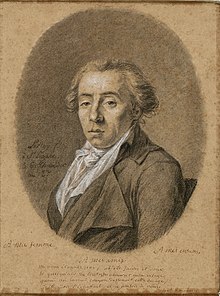Jean-Antoine Roucher

Saint-Lazare, by Hubert Robert
.Jean-Antoine Roucher (February 22, 1745 - July 25, 1794), was a French poet.
Roucher was born in
Turgot, and a salt-tax collectorship. His poem, entitled Les Mois, appeared in 1779, was praised in manuscript, but critically lambasted until the 19th century. The malicious wit of Antoine de Rivarol's mot on the critical failure of the poem, "Cest le plus beau naufrage du siècle," reflects the fact that one of the most elaborate passages describes a shipwreck.[1]
Roucher was a disciple of
Saint-Lazare. He was sent to the guillotine on the same tumbril as his friend André Chénier, on July 25, 1794.[2]
In 1790, Roucher had translated
Wealth of Nations. His letters from prison were edited by his son-in-law under the title of Consolations de ma captivité (1797), and his death was made the subject of an 1834 tragedy by his playwright brother Claude Roucher-Deratte, a voluminous writer.[2]
Honours
In 1847, botanist
Planch. named a genus of flowering plants from Nicaragua to southern Tropical America, in the family Linaceae, Roucheria in his honour.[3]
Then in 1921, botanist Hallier f., named a genus of flowering plants from Cambodia, Vietnam and Borneo, (also in the family Linaceae) Indorouchera in his honour, with the 'Indo' prefix.[4]
References
- ^ Chisholm 1911, pp. 767–768.
- ^ a b Chisholm 1911, p. 768.
- ^ "Roucheria Planch. | Plants of the World Online | Kew Science". Plants of the World Online. Retrieved 4 October 2021.
- ^ "Indorouchera Hallier f. | Plants of the World Online | Kew Science". Plants of the World Online. Retrieved 24 May 2021.
- This article incorporates text from a publication now in the public domain: Chisholm, Hugh, ed. (1911). "Roucher, Jean Antoine". Encyclopædia Britannica. Vol. 23 (11th ed.). Cambridge University Press. pp. 767–768.
Wikimedia Commons has media related to Jean-Antoine Roucher.
